Report: Entrepreneurship and Small Business Management, Semester 1
VerifiedAdded on 2020/07/22
|17
|4430
|60
Report
AI Summary
This report on Entrepreneurship and Small Business Management explores the multifaceted world of entrepreneurship. It begins by defining entrepreneurship and outlining various venture types, including lifestyle, growth, and survival ventures, alongside a typology based on social science and psychology. The report then analyzes the similarities and differences between private, public, and social enterprises, emphasizing their profit orientation and societal impact. It further discusses the impact of small and micro businesses on the UK economy, differentiating between micro, small, medium, and large-scale organizations. The second part of the report focuses on the importance of small businesses and start-ups in economic growth, differentiating between domestic and international entrepreneurship. The report then delves into the factors that make a successful entrepreneur, determining traits and characteristics, and examines the risks and rewards of starting a business. Additionally, it covers the important aspects of entrepreneurial personality, motivations, and techniques for shaping it. The report draws conclusions based on the analysis and provides a comprehensive overview of the subject.

ENTREPRENEURSH
IP AND SMALL
BUSINESS
MANAGEMENT
IP AND SMALL
BUSINESS
MANAGEMENT
Paraphrase This Document
Need a fresh take? Get an instant paraphrase of this document with our AI Paraphraser
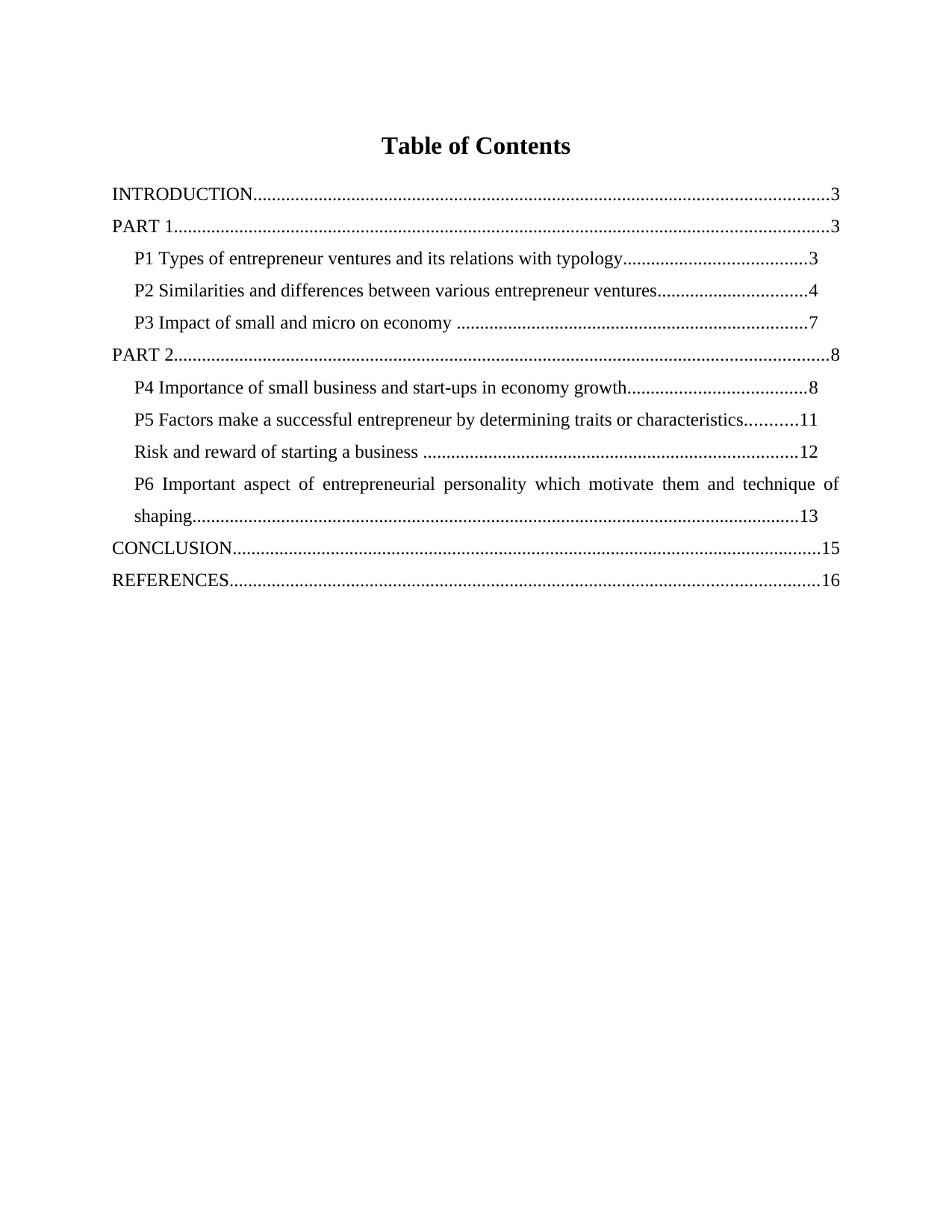
Table of Contents
INTRODUCTION...........................................................................................................................3
PART 1............................................................................................................................................3
P1 Types of entrepreneur ventures and its relations with typology.......................................3
P2 Similarities and differences between various entrepreneur ventures................................4
P3 Impact of small and micro on economy ...........................................................................7
PART 2............................................................................................................................................8
P4 Importance of small business and start-ups in economy growth......................................8
P5 Factors make a successful entrepreneur by determining traits or characteristics...........11
Risk and reward of starting a business ................................................................................12
P6 Important aspect of entrepreneurial personality which motivate them and technique of
shaping..................................................................................................................................13
CONCLUSION..............................................................................................................................15
REFERENCES..............................................................................................................................16
INTRODUCTION...........................................................................................................................3
PART 1............................................................................................................................................3
P1 Types of entrepreneur ventures and its relations with typology.......................................3
P2 Similarities and differences between various entrepreneur ventures................................4
P3 Impact of small and micro on economy ...........................................................................7
PART 2............................................................................................................................................8
P4 Importance of small business and start-ups in economy growth......................................8
P5 Factors make a successful entrepreneur by determining traits or characteristics...........11
Risk and reward of starting a business ................................................................................12
P6 Important aspect of entrepreneurial personality which motivate them and technique of
shaping..................................................................................................................................13
CONCLUSION..............................................................................................................................15
REFERENCES..............................................................................................................................16
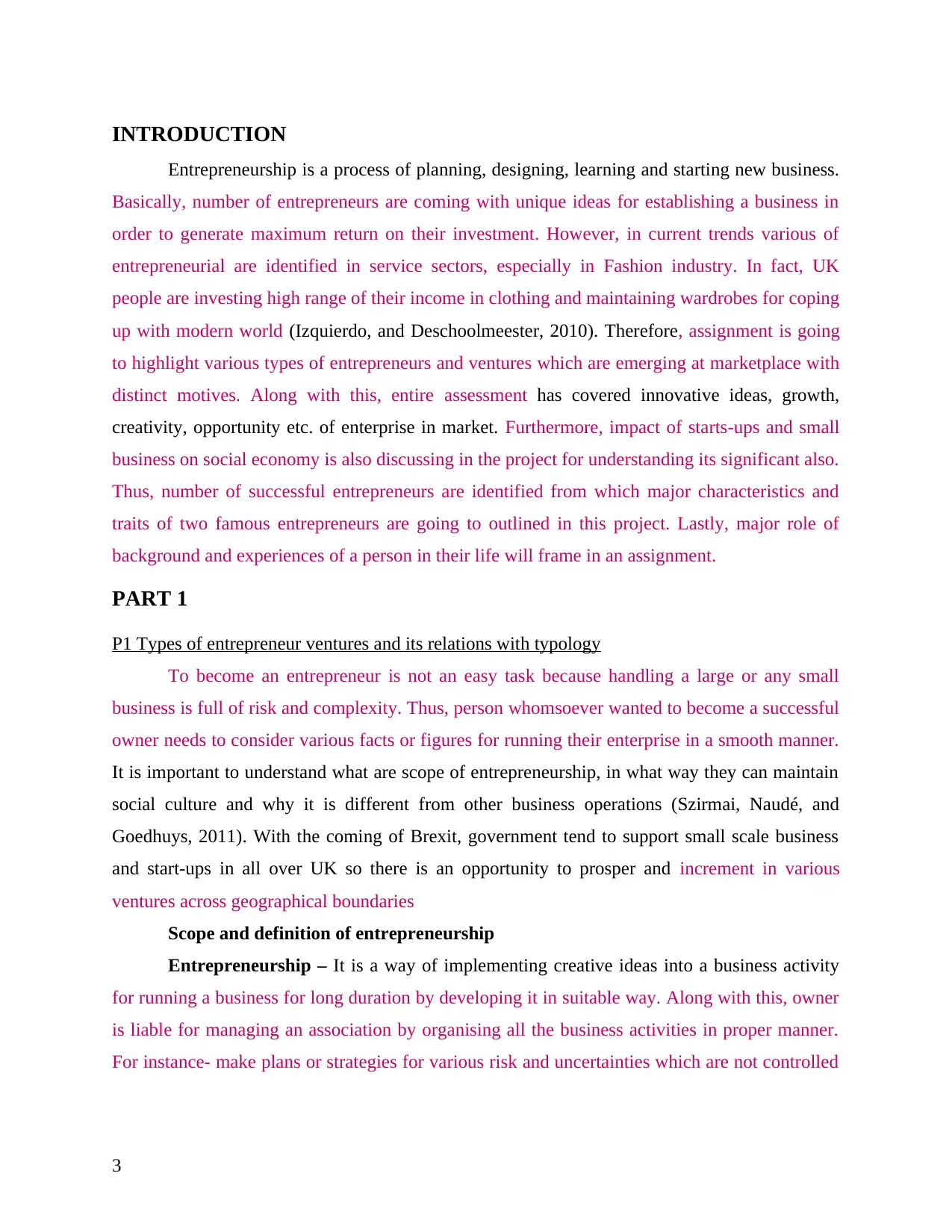
INTRODUCTION
Entrepreneurship is a process of planning, designing, learning and starting new business.
Basically, number of entrepreneurs are coming with unique ideas for establishing a business in
order to generate maximum return on their investment. However, in current trends various of
entrepreneurial are identified in service sectors, especially in Fashion industry. In fact, UK
people are investing high range of their income in clothing and maintaining wardrobes for coping
up with modern world (Izquierdo, and Deschoolmeester, 2010). Therefore, assignment is going
to highlight various types of entrepreneurs and ventures which are emerging at marketplace with
distinct motives. Along with this, entire assessment has covered innovative ideas, growth,
creativity, opportunity etc. of enterprise in market. Furthermore, impact of starts-ups and small
business on social economy is also discussing in the project for understanding its significant also.
Thus, number of successful entrepreneurs are identified from which major characteristics and
traits of two famous entrepreneurs are going to outlined in this project. Lastly, major role of
background and experiences of a person in their life will frame in an assignment.
PART 1
P1 Types of entrepreneur ventures and its relations with typology
To become an entrepreneur is not an easy task because handling a large or any small
business is full of risk and complexity. Thus, person whomsoever wanted to become a successful
owner needs to consider various facts or figures for running their enterprise in a smooth manner.
It is important to understand what are scope of entrepreneurship, in what way they can maintain
social culture and why it is different from other business operations (Szirmai, Naudé, and
Goedhuys, 2011). With the coming of Brexit, government tend to support small scale business
and start-ups in all over UK so there is an opportunity to prosper and increment in various
ventures across geographical boundaries
Scope and definition of entrepreneurship
Entrepreneurship – It is a way of implementing creative ideas into a business activity
for running a business for long duration by developing it in suitable way. Along with this, owner
is liable for managing an association by organising all the business activities in proper manner.
For instance- make plans or strategies for various risk and uncertainties which are not controlled
3
Entrepreneurship is a process of planning, designing, learning and starting new business.
Basically, number of entrepreneurs are coming with unique ideas for establishing a business in
order to generate maximum return on their investment. However, in current trends various of
entrepreneurial are identified in service sectors, especially in Fashion industry. In fact, UK
people are investing high range of their income in clothing and maintaining wardrobes for coping
up with modern world (Izquierdo, and Deschoolmeester, 2010). Therefore, assignment is going
to highlight various types of entrepreneurs and ventures which are emerging at marketplace with
distinct motives. Along with this, entire assessment has covered innovative ideas, growth,
creativity, opportunity etc. of enterprise in market. Furthermore, impact of starts-ups and small
business on social economy is also discussing in the project for understanding its significant also.
Thus, number of successful entrepreneurs are identified from which major characteristics and
traits of two famous entrepreneurs are going to outlined in this project. Lastly, major role of
background and experiences of a person in their life will frame in an assignment.
PART 1
P1 Types of entrepreneur ventures and its relations with typology
To become an entrepreneur is not an easy task because handling a large or any small
business is full of risk and complexity. Thus, person whomsoever wanted to become a successful
owner needs to consider various facts or figures for running their enterprise in a smooth manner.
It is important to understand what are scope of entrepreneurship, in what way they can maintain
social culture and why it is different from other business operations (Szirmai, Naudé, and
Goedhuys, 2011). With the coming of Brexit, government tend to support small scale business
and start-ups in all over UK so there is an opportunity to prosper and increment in various
ventures across geographical boundaries
Scope and definition of entrepreneurship
Entrepreneurship – It is a way of implementing creative ideas into a business activity
for running a business for long duration by developing it in suitable way. Along with this, owner
is liable for managing an association by organising all the business activities in proper manner.
For instance- make plans or strategies for various risk and uncertainties which are not controlled
3
⊘ This is a preview!⊘
Do you want full access?
Subscribe today to unlock all pages.

Trusted by 1+ million students worldwide
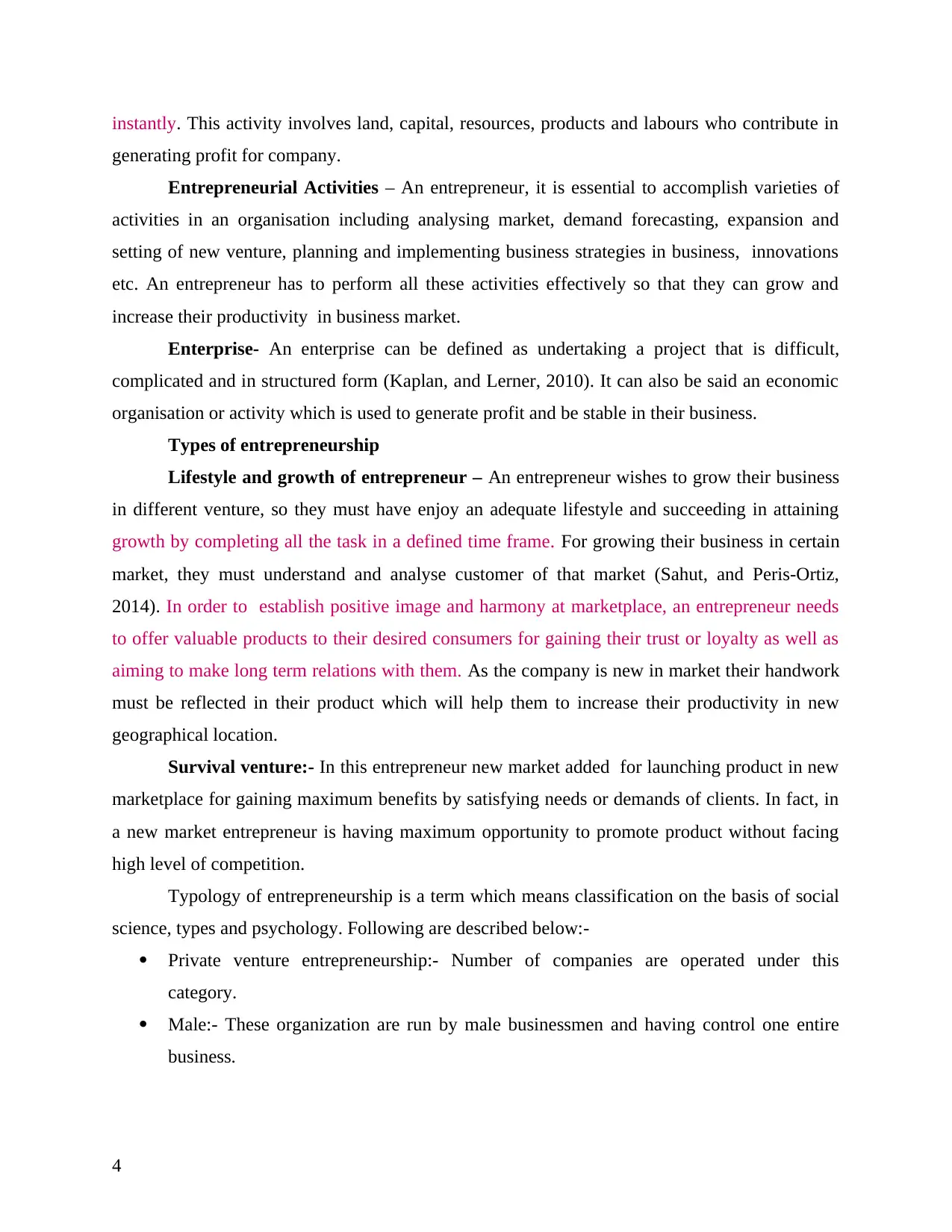
instantly. This activity involves land, capital, resources, products and labours who contribute in
generating profit for company.
Entrepreneurial Activities – An entrepreneur, it is essential to accomplish varieties of
activities in an organisation including analysing market, demand forecasting, expansion and
setting of new venture, planning and implementing business strategies in business, innovations
etc. An entrepreneur has to perform all these activities effectively so that they can grow and
increase their productivity in business market.
Enterprise- An enterprise can be defined as undertaking a project that is difficult,
complicated and in structured form (Kaplan, and Lerner, 2010). It can also be said an economic
organisation or activity which is used to generate profit and be stable in their business.
Types of entrepreneurship
Lifestyle and growth of entrepreneur – An entrepreneur wishes to grow their business
in different venture, so they must have enjoy an adequate lifestyle and succeeding in attaining
growth by completing all the task in a defined time frame. For growing their business in certain
market, they must understand and analyse customer of that market (Sahut, and Peris-Ortiz,
2014). In order to establish positive image and harmony at marketplace, an entrepreneur needs
to offer valuable products to their desired consumers for gaining their trust or loyalty as well as
aiming to make long term relations with them. As the company is new in market their handwork
must be reflected in their product which will help them to increase their productivity in new
geographical location.
Survival venture:- In this entrepreneur new market added for launching product in new
marketplace for gaining maximum benefits by satisfying needs or demands of clients. In fact, in
a new market entrepreneur is having maximum opportunity to promote product without facing
high level of competition.
Typology of entrepreneurship is a term which means classification on the basis of social
science, types and psychology. Following are described below:-
Private venture entrepreneurship:- Number of companies are operated under this
category.
Male:- These organization are run by male businessmen and having control one entire
business.
4
generating profit for company.
Entrepreneurial Activities – An entrepreneur, it is essential to accomplish varieties of
activities in an organisation including analysing market, demand forecasting, expansion and
setting of new venture, planning and implementing business strategies in business, innovations
etc. An entrepreneur has to perform all these activities effectively so that they can grow and
increase their productivity in business market.
Enterprise- An enterprise can be defined as undertaking a project that is difficult,
complicated and in structured form (Kaplan, and Lerner, 2010). It can also be said an economic
organisation or activity which is used to generate profit and be stable in their business.
Types of entrepreneurship
Lifestyle and growth of entrepreneur – An entrepreneur wishes to grow their business
in different venture, so they must have enjoy an adequate lifestyle and succeeding in attaining
growth by completing all the task in a defined time frame. For growing their business in certain
market, they must understand and analyse customer of that market (Sahut, and Peris-Ortiz,
2014). In order to establish positive image and harmony at marketplace, an entrepreneur needs
to offer valuable products to their desired consumers for gaining their trust or loyalty as well as
aiming to make long term relations with them. As the company is new in market their handwork
must be reflected in their product which will help them to increase their productivity in new
geographical location.
Survival venture:- In this entrepreneur new market added for launching product in new
marketplace for gaining maximum benefits by satisfying needs or demands of clients. In fact, in
a new market entrepreneur is having maximum opportunity to promote product without facing
high level of competition.
Typology of entrepreneurship is a term which means classification on the basis of social
science, types and psychology. Following are described below:-
Private venture entrepreneurship:- Number of companies are operated under this
category.
Male:- These organization are run by male businessmen and having control one entire
business.
4
Paraphrase This Document
Need a fresh take? Get an instant paraphrase of this document with our AI Paraphraser

Female:- Controlled or run by female organization in order to establish their image at
marketplace by gaining maximum benefits.
P2 Similarities and differences between various entrepreneur ventures
Different start- ups and business use different type of management style to manage their
business. Basically, every entrepreneur is having their own motive and reason behind
establishing a specific business. Thus, all the ventures are having major differences and
similarities between them which are described as follows:-
Types of
entrepren
eur
Private Public Social enterprise
Similariti
es
Profit oriented
Focussed in
gaining
maximum
attention of
consumers by
satisfying their
needs or
demands.
Requisite
maximum
amount of money
for initial
investment.
Profit based.
They are also
believe in
attracting
consumers.
Acquire Funds
from governing
bodies for running
their business.
More profit.
As per both the types
these venture is also
focussing on end users
because products are
finally consumed by
users.
Required sufficient
capital.
Differenc
es
Private
organizations are
totally based on
profit oriented by
grabbing market
opportunities.
These companies
are focussing on
developing the
society.
Controlled by
governing bodies.
These enterprise are
totally based on
serving society with
various necessary
services.
Believes in uplifting
5
marketplace by gaining maximum benefits.
P2 Similarities and differences between various entrepreneur ventures
Different start- ups and business use different type of management style to manage their
business. Basically, every entrepreneur is having their own motive and reason behind
establishing a specific business. Thus, all the ventures are having major differences and
similarities between them which are described as follows:-
Types of
entrepren
eur
Private Public Social enterprise
Similariti
es
Profit oriented
Focussed in
gaining
maximum
attention of
consumers by
satisfying their
needs or
demands.
Requisite
maximum
amount of money
for initial
investment.
Profit based.
They are also
believe in
attracting
consumers.
Acquire Funds
from governing
bodies for running
their business.
More profit.
As per both the types
these venture is also
focussing on end users
because products are
finally consumed by
users.
Required sufficient
capital.
Differenc
es
Private
organizations are
totally based on
profit oriented by
grabbing market
opportunities.
These companies
are focussing on
developing the
society.
Controlled by
governing bodies.
These enterprise are
totally based on
serving society with
various necessary
services.
Believes in uplifting
5
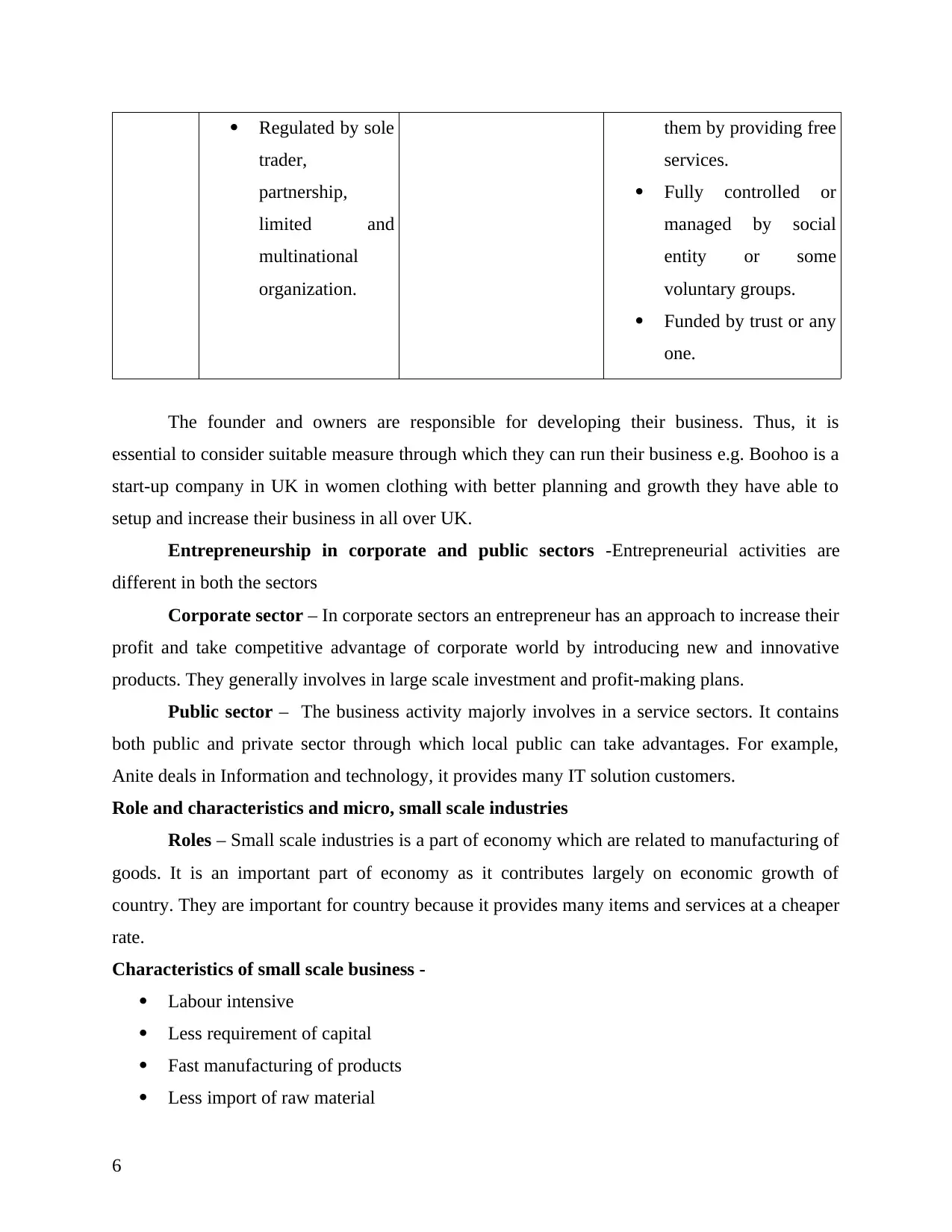
Regulated by sole
trader,
partnership,
limited and
multinational
organization.
them by providing free
services.
Fully controlled or
managed by social
entity or some
voluntary groups.
Funded by trust or any
one.
The founder and owners are responsible for developing their business. Thus, it is
essential to consider suitable measure through which they can run their business e.g. Boohoo is a
start-up company in UK in women clothing with better planning and growth they have able to
setup and increase their business in all over UK.
Entrepreneurship in corporate and public sectors -Entrepreneurial activities are
different in both the sectors
Corporate sector – In corporate sectors an entrepreneur has an approach to increase their
profit and take competitive advantage of corporate world by introducing new and innovative
products. They generally involves in large scale investment and profit-making plans.
Public sector – The business activity majorly involves in a service sectors. It contains
both public and private sector through which local public can take advantages. For example,
Anite deals in Information and technology, it provides many IT solution customers.
Role and characteristics and micro, small scale industries
Roles – Small scale industries is a part of economy which are related to manufacturing of
goods. It is an important part of economy as it contributes largely on economic growth of
country. They are important for country because it provides many items and services at a cheaper
rate.
Characteristics of small scale business -
Labour intensive
Less requirement of capital
Fast manufacturing of products
Less import of raw material
6
trader,
partnership,
limited and
multinational
organization.
them by providing free
services.
Fully controlled or
managed by social
entity or some
voluntary groups.
Funded by trust or any
one.
The founder and owners are responsible for developing their business. Thus, it is
essential to consider suitable measure through which they can run their business e.g. Boohoo is a
start-up company in UK in women clothing with better planning and growth they have able to
setup and increase their business in all over UK.
Entrepreneurship in corporate and public sectors -Entrepreneurial activities are
different in both the sectors
Corporate sector – In corporate sectors an entrepreneur has an approach to increase their
profit and take competitive advantage of corporate world by introducing new and innovative
products. They generally involves in large scale investment and profit-making plans.
Public sector – The business activity majorly involves in a service sectors. It contains
both public and private sector through which local public can take advantages. For example,
Anite deals in Information and technology, it provides many IT solution customers.
Role and characteristics and micro, small scale industries
Roles – Small scale industries is a part of economy which are related to manufacturing of
goods. It is an important part of economy as it contributes largely on economic growth of
country. They are important for country because it provides many items and services at a cheaper
rate.
Characteristics of small scale business -
Labour intensive
Less requirement of capital
Fast manufacturing of products
Less import of raw material
6
⊘ This is a preview!⊘
Do you want full access?
Subscribe today to unlock all pages.

Trusted by 1+ million students worldwide
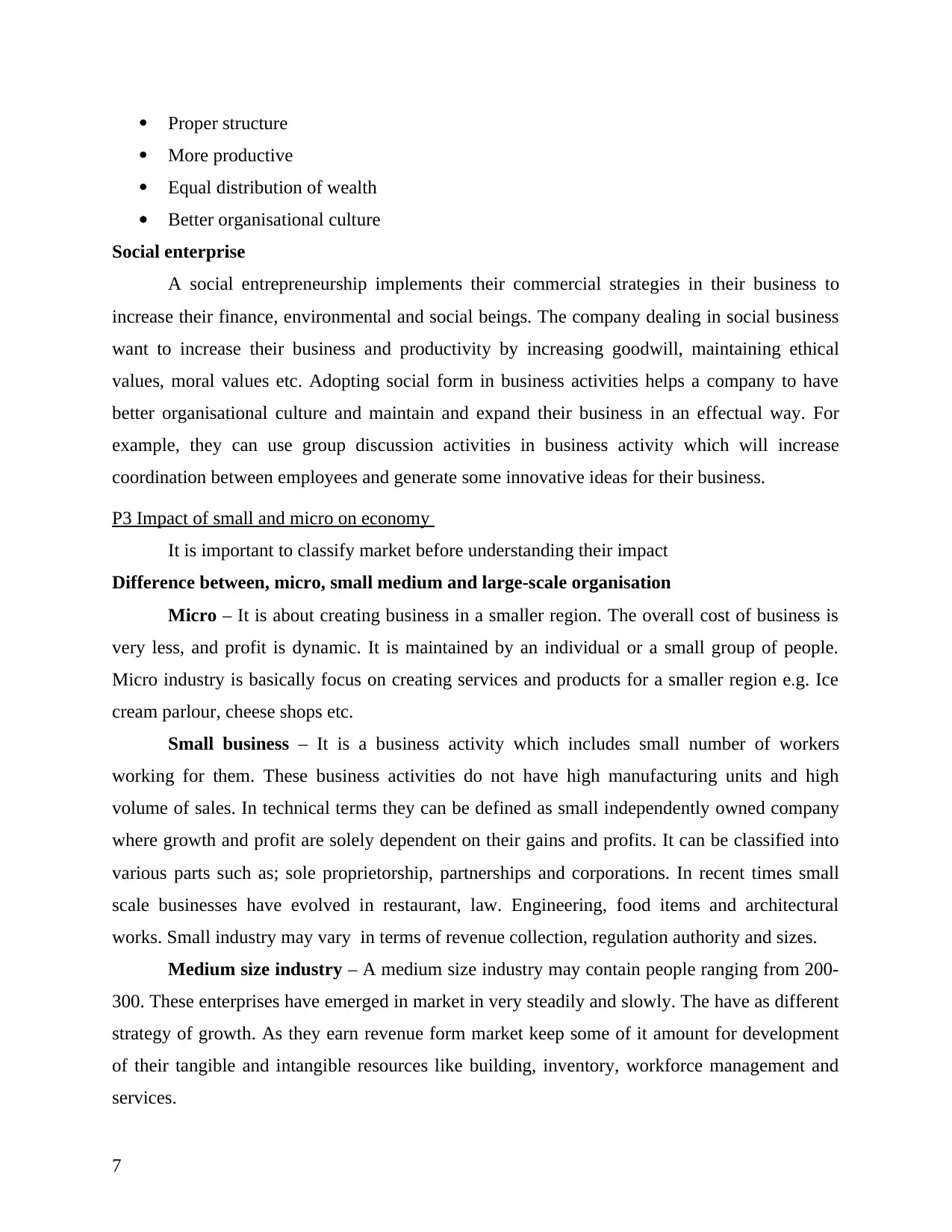
Proper structure
More productive
Equal distribution of wealth
Better organisational culture
Social enterprise
A social entrepreneurship implements their commercial strategies in their business to
increase their finance, environmental and social beings. The company dealing in social business
want to increase their business and productivity by increasing goodwill, maintaining ethical
values, moral values etc. Adopting social form in business activities helps a company to have
better organisational culture and maintain and expand their business in an effectual way. For
example, they can use group discussion activities in business activity which will increase
coordination between employees and generate some innovative ideas for their business.
P3 Impact of small and micro on economy
It is important to classify market before understanding their impact
Difference between, micro, small medium and large-scale organisation
Micro – It is about creating business in a smaller region. The overall cost of business is
very less, and profit is dynamic. It is maintained by an individual or a small group of people.
Micro industry is basically focus on creating services and products for a smaller region e.g. Ice
cream parlour, cheese shops etc.
Small business – It is a business activity which includes small number of workers
working for them. These business activities do not have high manufacturing units and high
volume of sales. In technical terms they can be defined as small independently owned company
where growth and profit are solely dependent on their gains and profits. It can be classified into
various parts such as; sole proprietorship, partnerships and corporations. In recent times small
scale businesses have evolved in restaurant, law. Engineering, food items and architectural
works. Small industry may vary in terms of revenue collection, regulation authority and sizes.
Medium size industry – A medium size industry may contain people ranging from 200-
300. These enterprises have emerged in market in very steadily and slowly. The have as different
strategy of growth. As they earn revenue form market keep some of it amount for development
of their tangible and intangible resources like building, inventory, workforce management and
services.
7
More productive
Equal distribution of wealth
Better organisational culture
Social enterprise
A social entrepreneurship implements their commercial strategies in their business to
increase their finance, environmental and social beings. The company dealing in social business
want to increase their business and productivity by increasing goodwill, maintaining ethical
values, moral values etc. Adopting social form in business activities helps a company to have
better organisational culture and maintain and expand their business in an effectual way. For
example, they can use group discussion activities in business activity which will increase
coordination between employees and generate some innovative ideas for their business.
P3 Impact of small and micro on economy
It is important to classify market before understanding their impact
Difference between, micro, small medium and large-scale organisation
Micro – It is about creating business in a smaller region. The overall cost of business is
very less, and profit is dynamic. It is maintained by an individual or a small group of people.
Micro industry is basically focus on creating services and products for a smaller region e.g. Ice
cream parlour, cheese shops etc.
Small business – It is a business activity which includes small number of workers
working for them. These business activities do not have high manufacturing units and high
volume of sales. In technical terms they can be defined as small independently owned company
where growth and profit are solely dependent on their gains and profits. It can be classified into
various parts such as; sole proprietorship, partnerships and corporations. In recent times small
scale businesses have evolved in restaurant, law. Engineering, food items and architectural
works. Small industry may vary in terms of revenue collection, regulation authority and sizes.
Medium size industry – A medium size industry may contain people ranging from 200-
300. These enterprises have emerged in market in very steadily and slowly. The have as different
strategy of growth. As they earn revenue form market keep some of it amount for development
of their tangible and intangible resources like building, inventory, workforce management and
services.
7
Paraphrase This Document
Need a fresh take? Get an instant paraphrase of this document with our AI Paraphraser
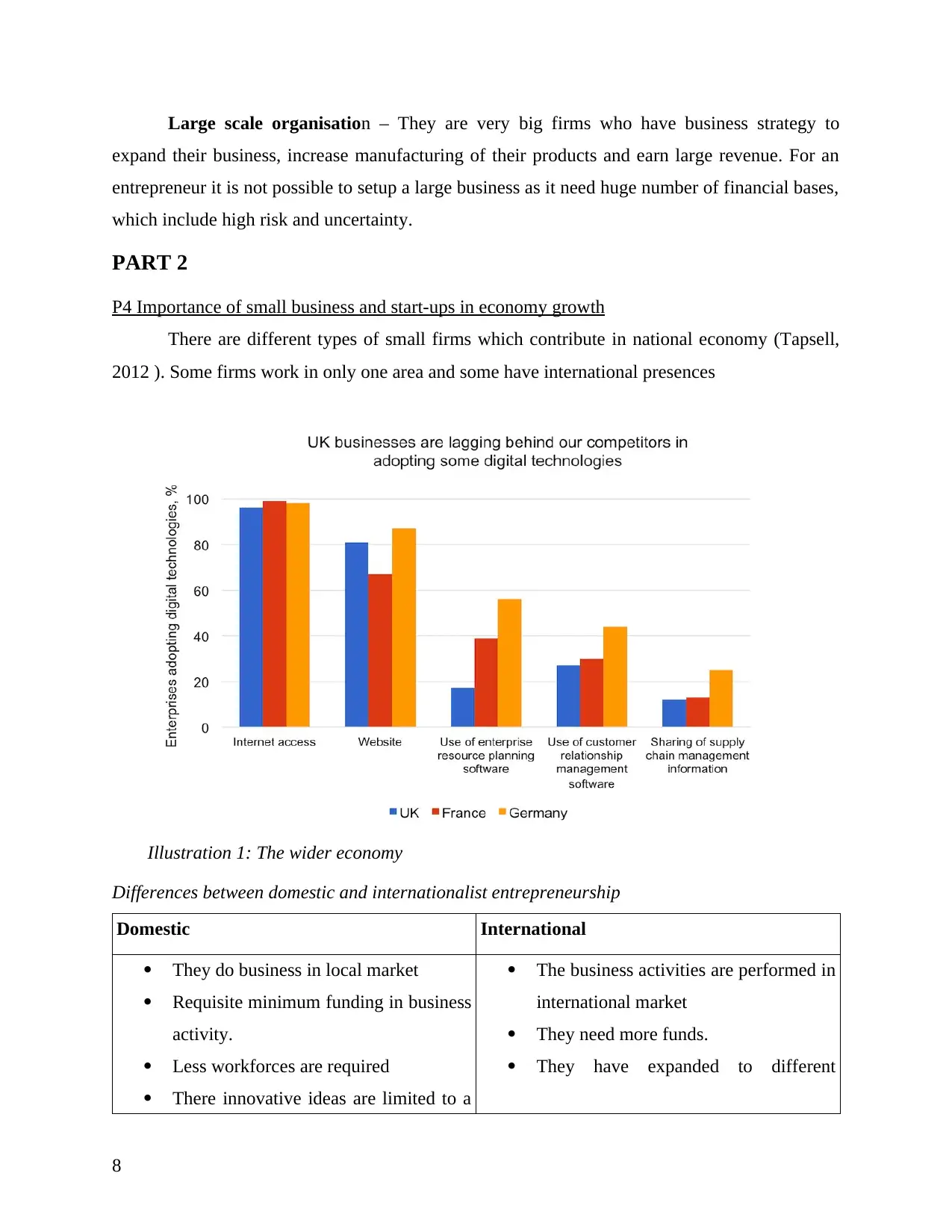
Large scale organisation – They are very big firms who have business strategy to
expand their business, increase manufacturing of their products and earn large revenue. For an
entrepreneur it is not possible to setup a large business as it need huge number of financial bases,
which include high risk and uncertainty.
PART 2
P4 Importance of small business and start-ups in economy growth
There are different types of small firms which contribute in national economy (Tapsell,
2012 ). Some firms work in only one area and some have international presences
Differences between domestic and internationalist entrepreneurship
Domestic International
They do business in local market
Requisite minimum funding in business
activity.
Less workforces are required
There innovative ideas are limited to a
The business activities are performed in
international market
They need more funds.
They have expanded to different
8
Illustration 1: The wider economy
expand their business, increase manufacturing of their products and earn large revenue. For an
entrepreneur it is not possible to setup a large business as it need huge number of financial bases,
which include high risk and uncertainty.
PART 2
P4 Importance of small business and start-ups in economy growth
There are different types of small firms which contribute in national economy (Tapsell,
2012 ). Some firms work in only one area and some have international presences
Differences between domestic and internationalist entrepreneurship
Domestic International
They do business in local market
Requisite minimum funding in business
activity.
Less workforces are required
There innovative ideas are limited to a
The business activities are performed in
international market
They need more funds.
They have expanded to different
8
Illustration 1: The wider economy
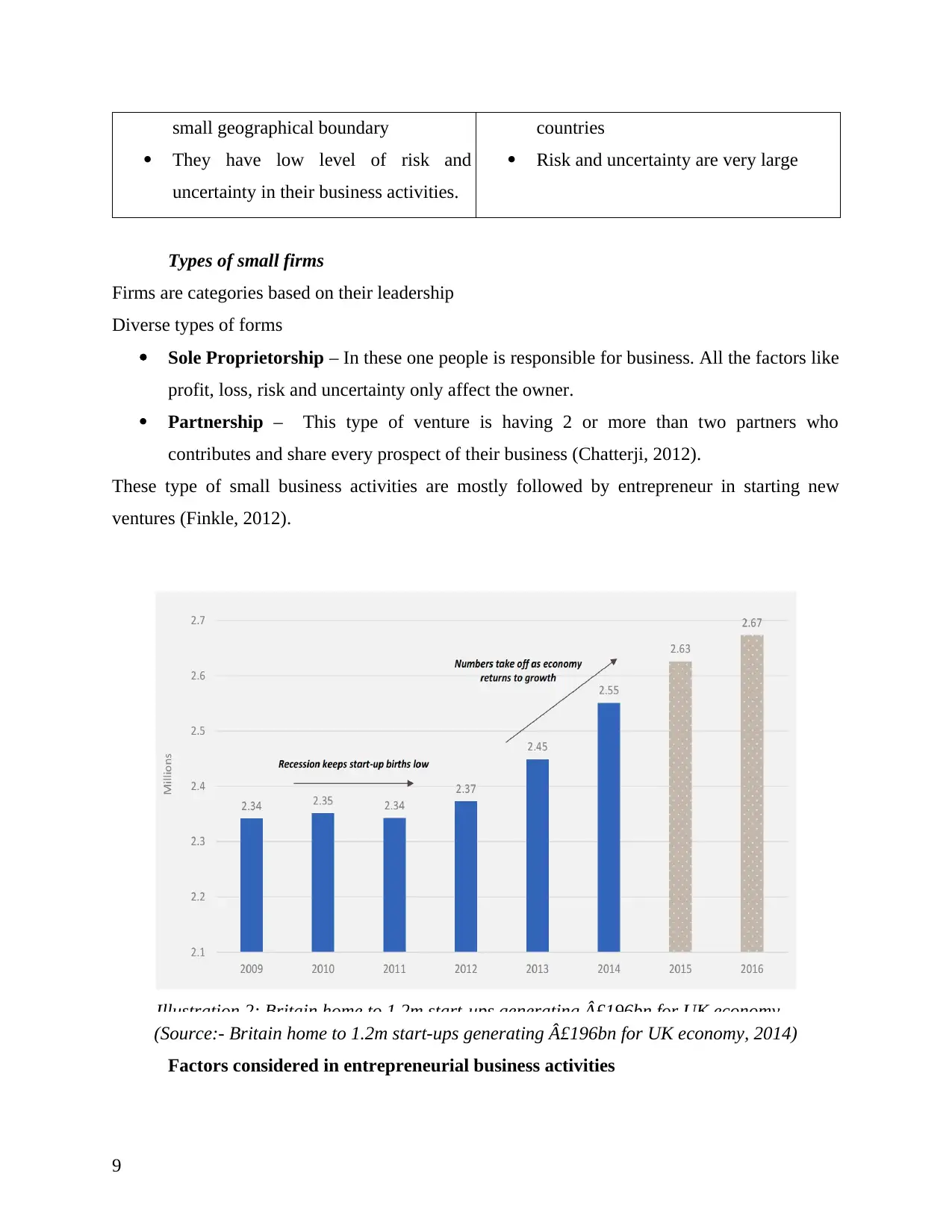
small geographical boundary
They have low level of risk and
uncertainty in their business activities.
countries
Risk and uncertainty are very large
Types of small firms
Firms are categories based on their leadership
Diverse types of forms
Sole Proprietorship – In these one people is responsible for business. All the factors like
profit, loss, risk and uncertainty only affect the owner.
Partnership – This type of venture is having 2 or more than two partners who
contributes and share every prospect of their business (Chatterji, 2012).
These type of small business activities are mostly followed by entrepreneur in starting new
ventures (Finkle, 2012).
(Source:- Britain home to 1.2m start-ups generating £196bn for UK economy, 2014)
Factors considered in entrepreneurial business activities
9
Illustration 2: Britain home to 1.2m start-ups generating £196bn for UK economy
They have low level of risk and
uncertainty in their business activities.
countries
Risk and uncertainty are very large
Types of small firms
Firms are categories based on their leadership
Diverse types of forms
Sole Proprietorship – In these one people is responsible for business. All the factors like
profit, loss, risk and uncertainty only affect the owner.
Partnership – This type of venture is having 2 or more than two partners who
contributes and share every prospect of their business (Chatterji, 2012).
These type of small business activities are mostly followed by entrepreneur in starting new
ventures (Finkle, 2012).
(Source:- Britain home to 1.2m start-ups generating £196bn for UK economy, 2014)
Factors considered in entrepreneurial business activities
9
Illustration 2: Britain home to 1.2m start-ups generating £196bn for UK economy
⊘ This is a preview!⊘
Do you want full access?
Subscribe today to unlock all pages.

Trusted by 1+ million students worldwide
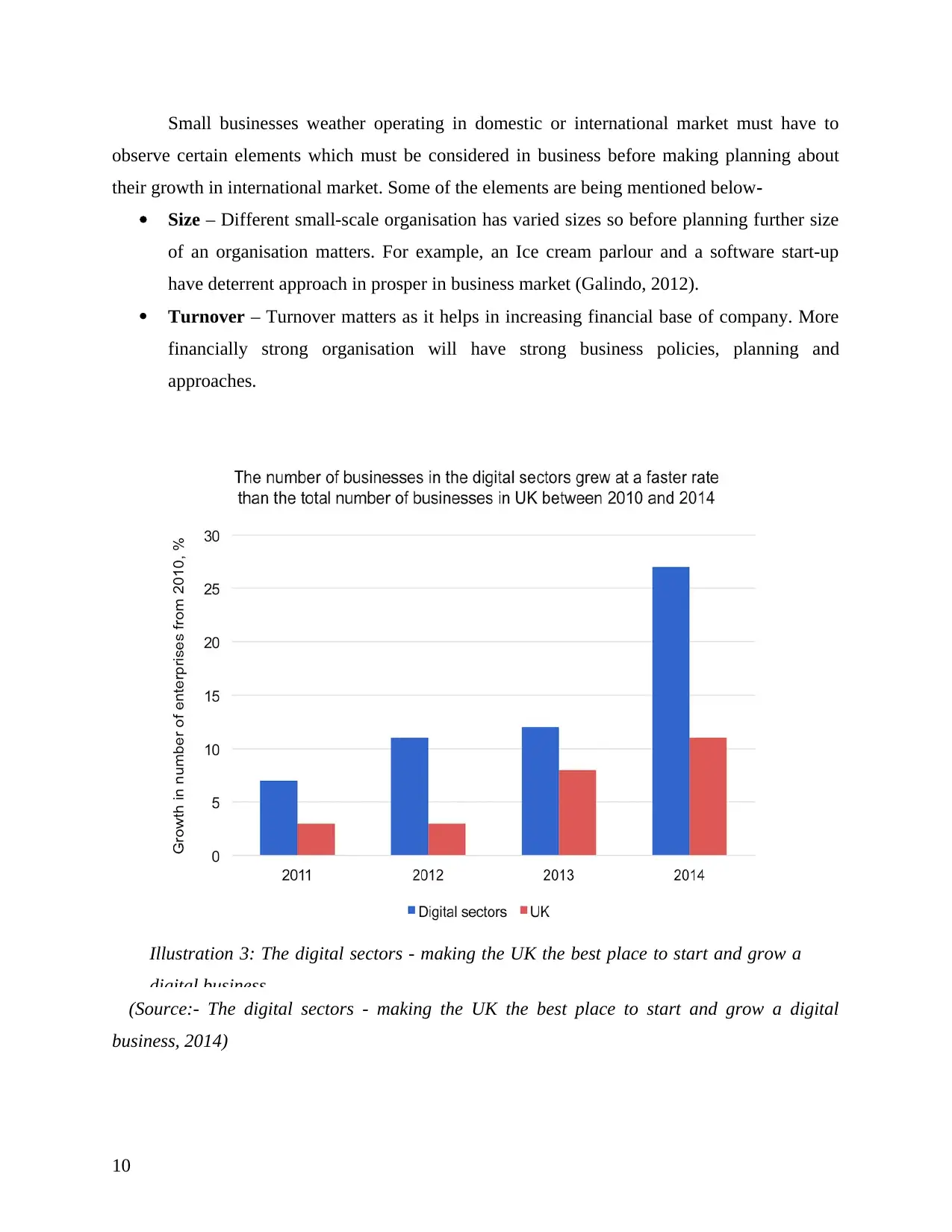
Small businesses weather operating in domestic or international market must have to
observe certain elements which must be considered in business before making planning about
their growth in international market. Some of the elements are being mentioned below-
Size – Different small-scale organisation has varied sizes so before planning further size
of an organisation matters. For example, an Ice cream parlour and a software start-up
have deterrent approach in prosper in business market (Galindo, 2012).
Turnover – Turnover matters as it helps in increasing financial base of company. More
financially strong organisation will have strong business policies, planning and
approaches.
(Source:- The digital sectors - making the UK the best place to start and grow a digital
business, 2014)
10
Illustration 3: The digital sectors - making the UK the best place to start and grow a
digital business
observe certain elements which must be considered in business before making planning about
their growth in international market. Some of the elements are being mentioned below-
Size – Different small-scale organisation has varied sizes so before planning further size
of an organisation matters. For example, an Ice cream parlour and a software start-up
have deterrent approach in prosper in business market (Galindo, 2012).
Turnover – Turnover matters as it helps in increasing financial base of company. More
financially strong organisation will have strong business policies, planning and
approaches.
(Source:- The digital sectors - making the UK the best place to start and grow a digital
business, 2014)
10
Illustration 3: The digital sectors - making the UK the best place to start and grow a
digital business
Paraphrase This Document
Need a fresh take? Get an instant paraphrase of this document with our AI Paraphraser
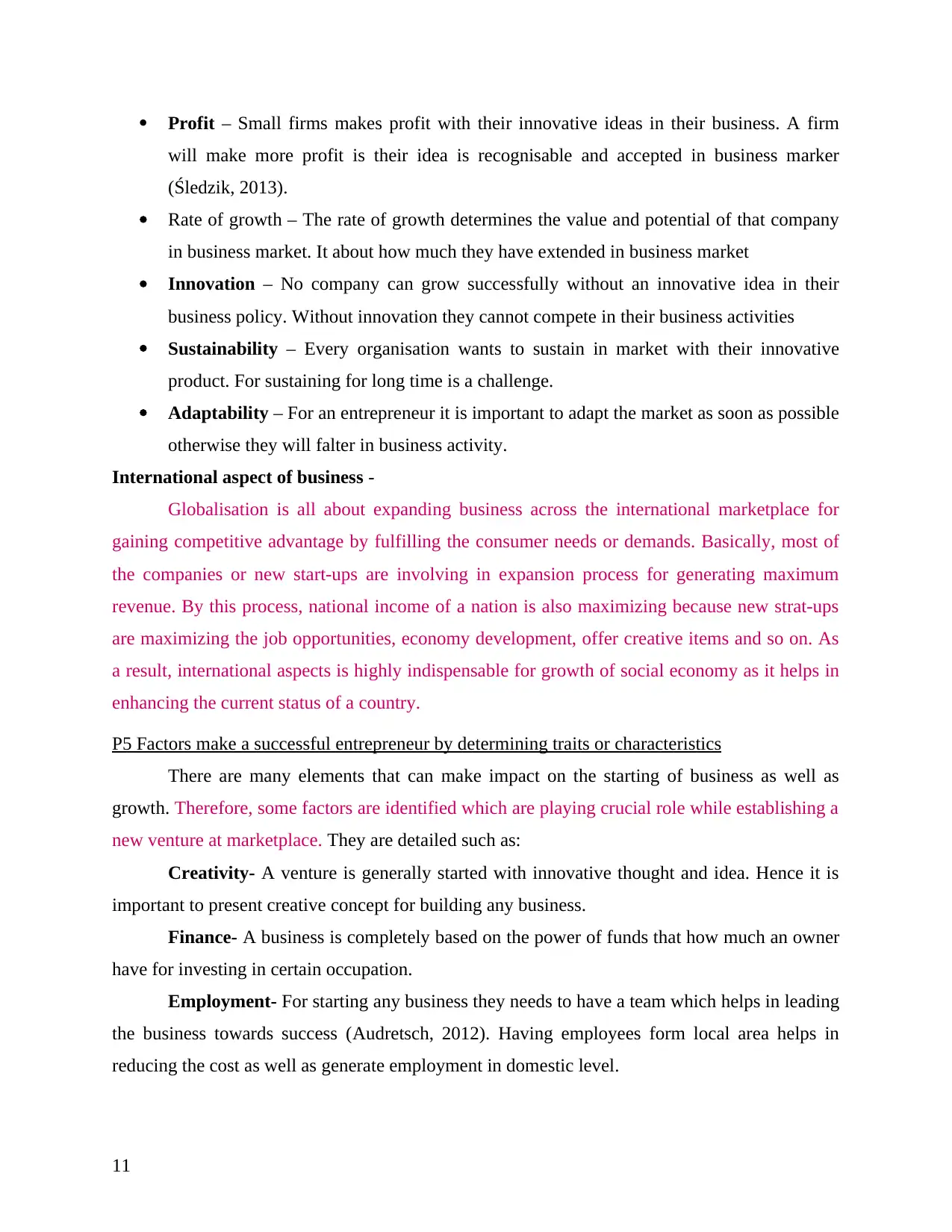
Profit – Small firms makes profit with their innovative ideas in their business. A firm
will make more profit is their idea is recognisable and accepted in business marker
(Śledzik, 2013).
Rate of growth – The rate of growth determines the value and potential of that company
in business market. It about how much they have extended in business market
Innovation – No company can grow successfully without an innovative idea in their
business policy. Without innovation they cannot compete in their business activities
Sustainability – Every organisation wants to sustain in market with their innovative
product. For sustaining for long time is a challenge.
Adaptability – For an entrepreneur it is important to adapt the market as soon as possible
otherwise they will falter in business activity.
International aspect of business -
Globalisation is all about expanding business across the international marketplace for
gaining competitive advantage by fulfilling the consumer needs or demands. Basically, most of
the companies or new start-ups are involving in expansion process for generating maximum
revenue. By this process, national income of a nation is also maximizing because new strat-ups
are maximizing the job opportunities, economy development, offer creative items and so on. As
a result, international aspects is highly indispensable for growth of social economy as it helps in
enhancing the current status of a country.
P5 Factors make a successful entrepreneur by determining traits or characteristics
There are many elements that can make impact on the starting of business as well as
growth. Therefore, some factors are identified which are playing crucial role while establishing a
new venture at marketplace. They are detailed such as:
Creativity- A venture is generally started with innovative thought and idea. Hence it is
important to present creative concept for building any business.
Finance- A business is completely based on the power of funds that how much an owner
have for investing in certain occupation.
Employment- For starting any business they needs to have a team which helps in leading
the business towards success (Audretsch, 2012). Having employees form local area helps in
reducing the cost as well as generate employment in domestic level.
11
will make more profit is their idea is recognisable and accepted in business marker
(Śledzik, 2013).
Rate of growth – The rate of growth determines the value and potential of that company
in business market. It about how much they have extended in business market
Innovation – No company can grow successfully without an innovative idea in their
business policy. Without innovation they cannot compete in their business activities
Sustainability – Every organisation wants to sustain in market with their innovative
product. For sustaining for long time is a challenge.
Adaptability – For an entrepreneur it is important to adapt the market as soon as possible
otherwise they will falter in business activity.
International aspect of business -
Globalisation is all about expanding business across the international marketplace for
gaining competitive advantage by fulfilling the consumer needs or demands. Basically, most of
the companies or new start-ups are involving in expansion process for generating maximum
revenue. By this process, national income of a nation is also maximizing because new strat-ups
are maximizing the job opportunities, economy development, offer creative items and so on. As
a result, international aspects is highly indispensable for growth of social economy as it helps in
enhancing the current status of a country.
P5 Factors make a successful entrepreneur by determining traits or characteristics
There are many elements that can make impact on the starting of business as well as
growth. Therefore, some factors are identified which are playing crucial role while establishing a
new venture at marketplace. They are detailed such as:
Creativity- A venture is generally started with innovative thought and idea. Hence it is
important to present creative concept for building any business.
Finance- A business is completely based on the power of funds that how much an owner
have for investing in certain occupation.
Employment- For starting any business they needs to have a team which helps in leading
the business towards success (Audretsch, 2012). Having employees form local area helps in
reducing the cost as well as generate employment in domestic level.
11
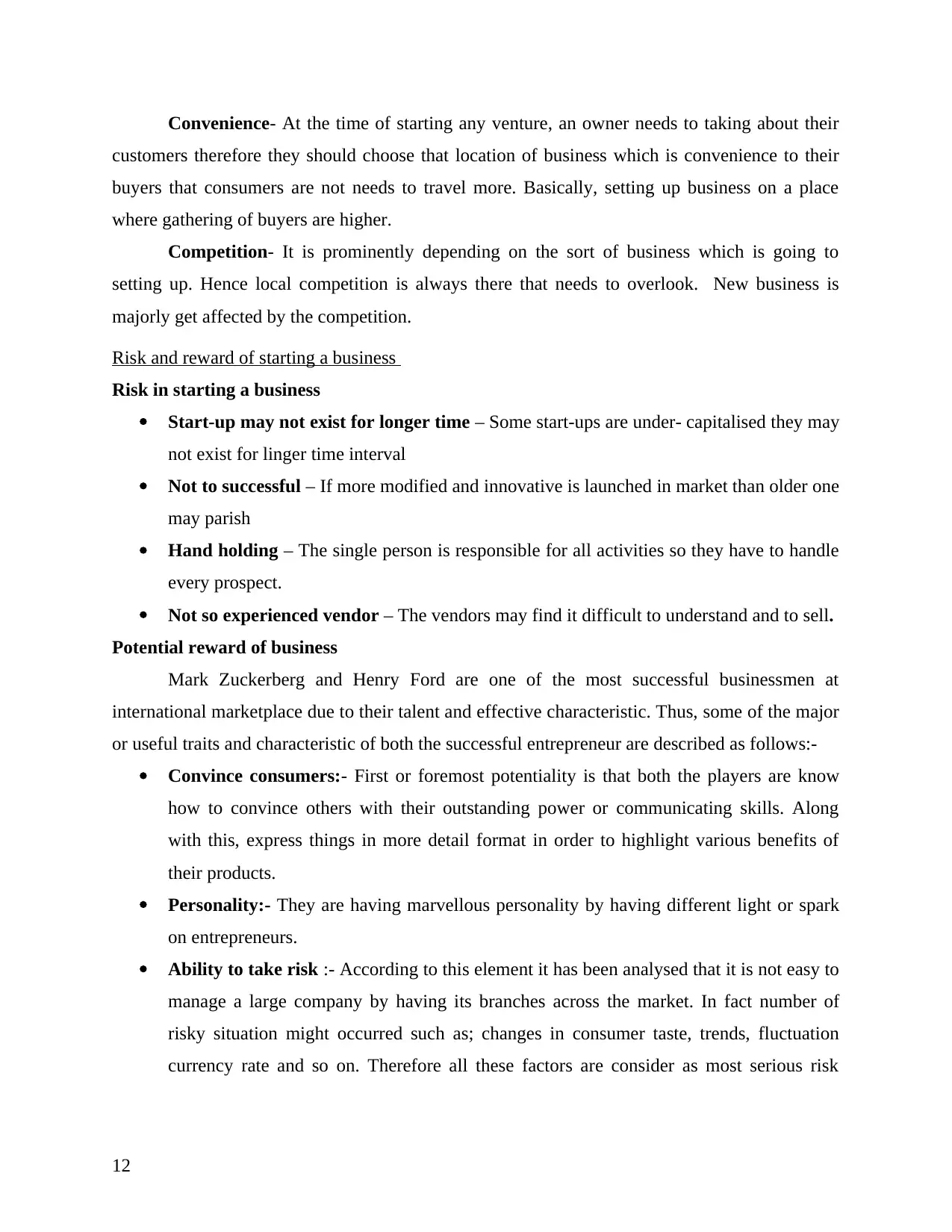
Convenience- At the time of starting any venture, an owner needs to taking about their
customers therefore they should choose that location of business which is convenience to their
buyers that consumers are not needs to travel more. Basically, setting up business on a place
where gathering of buyers are higher.
Competition- It is prominently depending on the sort of business which is going to
setting up. Hence local competition is always there that needs to overlook. New business is
majorly get affected by the competition.
Risk and reward of starting a business
Risk in starting a business
Start-up may not exist for longer time – Some start-ups are under- capitalised they may
not exist for linger time interval
Not to successful – If more modified and innovative is launched in market than older one
may parish
Hand holding – The single person is responsible for all activities so they have to handle
every prospect.
Not so experienced vendor – The vendors may find it difficult to understand and to sell.
Potential reward of business
Mark Zuckerberg and Henry Ford are one of the most successful businessmen at
international marketplace due to their talent and effective characteristic. Thus, some of the major
or useful traits and characteristic of both the successful entrepreneur are described as follows:-
Convince consumers:- First or foremost potentiality is that both the players are know
how to convince others with their outstanding power or communicating skills. Along
with this, express things in more detail format in order to highlight various benefits of
their products.
Personality:- They are having marvellous personality by having different light or spark
on entrepreneurs.
Ability to take risk :- According to this element it has been analysed that it is not easy to
manage a large company by having its branches across the market. In fact number of
risky situation might occurred such as; changes in consumer taste, trends, fluctuation
currency rate and so on. Therefore all these factors are consider as most serious risk
12
customers therefore they should choose that location of business which is convenience to their
buyers that consumers are not needs to travel more. Basically, setting up business on a place
where gathering of buyers are higher.
Competition- It is prominently depending on the sort of business which is going to
setting up. Hence local competition is always there that needs to overlook. New business is
majorly get affected by the competition.
Risk and reward of starting a business
Risk in starting a business
Start-up may not exist for longer time – Some start-ups are under- capitalised they may
not exist for linger time interval
Not to successful – If more modified and innovative is launched in market than older one
may parish
Hand holding – The single person is responsible for all activities so they have to handle
every prospect.
Not so experienced vendor – The vendors may find it difficult to understand and to sell.
Potential reward of business
Mark Zuckerberg and Henry Ford are one of the most successful businessmen at
international marketplace due to their talent and effective characteristic. Thus, some of the major
or useful traits and characteristic of both the successful entrepreneur are described as follows:-
Convince consumers:- First or foremost potentiality is that both the players are know
how to convince others with their outstanding power or communicating skills. Along
with this, express things in more detail format in order to highlight various benefits of
their products.
Personality:- They are having marvellous personality by having different light or spark
on entrepreneurs.
Ability to take risk :- According to this element it has been analysed that it is not easy to
manage a large company by having its branches across the market. In fact number of
risky situation might occurred such as; changes in consumer taste, trends, fluctuation
currency rate and so on. Therefore all these factors are consider as most serious risk
12
⊘ This is a preview!⊘
Do you want full access?
Subscribe today to unlock all pages.

Trusted by 1+ million students worldwide
1 out of 17
Related Documents
Your All-in-One AI-Powered Toolkit for Academic Success.
+13062052269
info@desklib.com
Available 24*7 on WhatsApp / Email
![[object Object]](/_next/static/media/star-bottom.7253800d.svg)
Unlock your academic potential
Copyright © 2020–2026 A2Z Services. All Rights Reserved. Developed and managed by ZUCOL.





